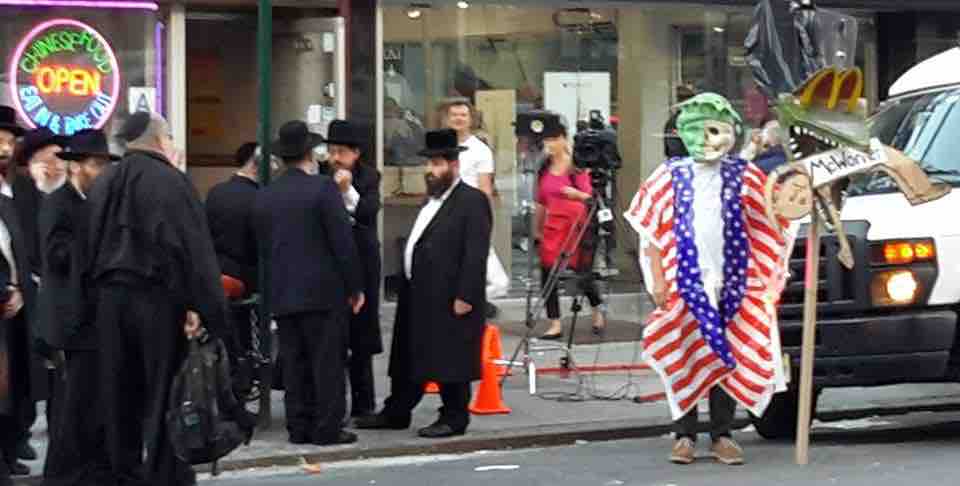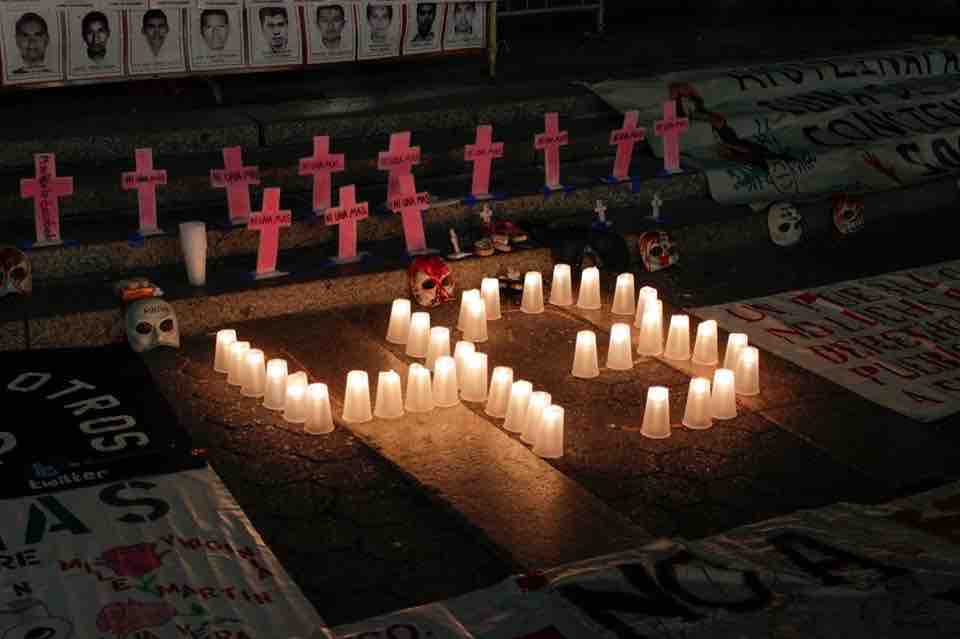Follow the Money: Enlace and the Prison Divestment Campaign (3/24/2016)
With their expertise in corporate research, Enlace's Daniel Carrillo and Peter Cervantes-Gautschi discovered that Corrections Corporation of America–the largest private prison firm in the United States–had actually drafted a bill to criminalize immigrants, all so they could be locked up in CCA's prisons. That bill, the infamous SB1070, passed in Arizona in April of 2010 due to the lobbying power of CCA, and copycat laws immediately sprang up across the country in more than two dozen states. Although the worst of SB 1070's provisions were declared unconstitutional by the Supreme Court, the bill signified an ideological victory which we have yet to recover from: that immigrants and people of color are criminals.
![]()
Students protest UC funding of private prisons (Photo via Common Dreams)
Enlace --- "People are afraid," said Nadia Marin Molina, formerly of The Workplace Project, "People are working in dangerous conditions and their employers are stealing from them because they're afraid to organize." Spoken back in 2006 at a meeting of low-wage worker organizations, Nadia's statement was a thermometer check on the shifting state of organizing in the United States. The statement, and the conversations, strategizing and organizing that followed, have led to a national campaign that has achieved over $720 million of divestment from the private prison industry, and built a unified movement among Black, Brown and immigrant communities for decriminalization, decarceration, and reinvestment in their communities.
TweetThe meeting was held by Enlace, an international organization based in the United States that works to build the capacity of low-wage worker organizations in order for them to fight for their own self-determination. Founded in 1998, Enlace originally dealt with the challenges of worker organizing in a globalized world dominated by powerful, multinational corporations by providing intensive and free or low-cost trainings to workers in its Institute, and by joining local organizations in their campaigns. When Nadia made her statement in 2008, Enlace and the multinational, multi-sector alliances it had fostered were ready to deal with a new crisis facing society and poor workers, immigrants, and people of color: the era of immigration enforcement and mass incarceration.
With their expertise in corporate research, Enlace's Daniel Carrillo and Peter Cervantes-Gautschi discovered that Corrections Corporation of America–the largest private prison firm in the United States–had actually drafted a bill to criminalize immigrants, all so they could be locked up in CCA's prisons. That bill, the infamous SB1070, passed in Arizona in April of 2010 due to the lobbying power of CCA, and copycat laws immediately sprang up across the country in more than two dozen states. Although the worst of SB 1070's provisions were declared unconstitutional by the Supreme Court, the bill signified an ideological victory which we have yet to recover from: that immigrants and people of color are criminals.
This moment of crisis spurred Enlace to found the Prison Divestment Campaign, a national effort that aims to break the lobbying power of private prisons by targeting all major investors in the for-profit prison industry. "When we realized just how much big money was driving the prison complex, we knew we had to follow the money, to take on this system of state and corporate violence against people of color and immigrants," said Daniel Carrillo, now the Executive Director of Enlace. "We are working to dismantle a driver of mass incarceration and immigration enforcement—for-profit prison industry companies that spend millions lobbying each year--so we can end the criminalization of our communities." Since 2011, the Prison Divestment Campaign has been working to subvert the lobbying power of the for-profit prison industry, end the unjust imprisonment of immigrants and people of color, and stop prison lobbyists from drafting and promoting more racist, inhumane legislation.
Transforming Campaigns & Movement NarrativesThe campaign kicked off with huge victories. In the first days of its launch, the largest investor in CCA fully divested $180 million of its holdings in the company after advocates staged a protest in Central Park, outside the home of hedge fund manager. In the first months of the campaign, dozens of actions were held by religious, labor, immigrant rights, and criminal justice organizations across the country, targeting Wells Fargo in the hey-day of corporate accountability organizing during the Occupy Movement. In one action day laborers spoke out at a Wells Fargo shareholder meeting in San Francisco to denounce their prison profiteering, while community members in Denver gathered outside their office demanding divestment. Wells Fargo ultimately dumped 80% of its holdings in GEO Group in response to the Divestment Campaign's pressure tactics.
Eventually, taking on corporations was not enough. "As a small organization whose power comes from our strong multi-sector, multiracial alliances and expertise in corporate campaigns," Carrillo said, "We are responsive to changing realities and know that we must always work to include more voices and leadership from directly impacted and underrepresented communities." Since 2013, the campaign, under the guidance of its intersectional steering committee, has been pressuring universities, cities, and pension funds to divest from prisons and big banks like Wells Fargo, who still invest heavily in the industry and profit off of the incarceration of immigrant and black communities.
The victories have racked up. In just the last year, two corporations, one philanthropic foundation, and Columbia University, California State University Los Angeles and the University of California's endowments have fully divested from private prisons. Speaking on the victory to push the UC-the biggest endowment fund in the world to divest from prisons-Afrikan Black Coalition organizer Kamilah Moore, said, "We will continue to call for complete divestment, increased transparency, and reinvestment in education and businesses owned or controlled by the formerly incarcerated." Meanwhile, the City of Portland has passed resolutions that put it on the path to divestment from major prison investors, and the New York State Teachers' Retirement System has called for a review of whether their pension is invested in prisons. To build off these momentous victories, the Campaign has added to its demands: it is now calling for reinvestment in the needs of low-income communities who have been impacted by mass incarceration and immigration enforcement.
The Campaign achieved a historic "divest-reinvest" victory at the California State University of Los Angeles. At CSULA, Black-led student organizing accomplished divestment from private prisons as well as concrete commitments by the University to reinvest in Black scholars and all students of color. The university will create a Black Scholars' living learning community, allocate $100,000 to the Cross Cultural Centers, require all students to complete one diversity course and one race and ethnicity course, allocate $100,000 for staffing and other costs to increase the yield of Black students who get accepted into CSULA; and the hiring of new staff psychologists who have demonstrated experience in working with Black students. This inspiring story displays that divestment is a national framework that provides opportunities for local communities to demand the reinvestment in their communities that they want and need.
"Prison divestment is a praxis for dismantling this cycle of ever-increasing incarceration. This work centralizes an anti-racist, anti-imperialist liberation narrative that draws the parallels between anti-immigrant and anti-Black oppression, between immigration enforcement and mass incarceration, and proffers concrete, immediate and sustained action," said Carrillo. "Through reinvestment, we are creating our own narrative." Prison divestment is changing the narrative of organizing against incarceration, detention and criminalization and building Black and Brown unity to take on, not just private prisons, but policing and new forms of criminalization and incarceration.
The campaign broke ground when it addressed the role of financial institutions in the prison industry, and those unlikely bedfellows in politics. Now, the campaign is breaking ground by exposing and demanding an end to the tax breaks private prisons receive, by calling for reinvestment in communities that repairs the damage of a legacy of racialized oppression, and connecting economic and climate justice to broad-based demands for true criminal and migrant justice.
The Prison Divestment Campaign holds annual convenings, actions, youth retreats, and local campaigns that bring to light the role of the prison industry and financial institutional stakeholders; the intersection of criminal (in)justice and immigration; and incarceration and the economy. The campaign is guided by and accountable to the steering committee made up of national and regional organizations, and local coalitions leading city, university, corporate, and pension campaigns. The campaign provides a strategic target for multiracial communities, to both target to advance social change and uncover the root causes of major racial, economic, and social issues plaguing the country. For more information, please email us at info@enlaceintl.org.






